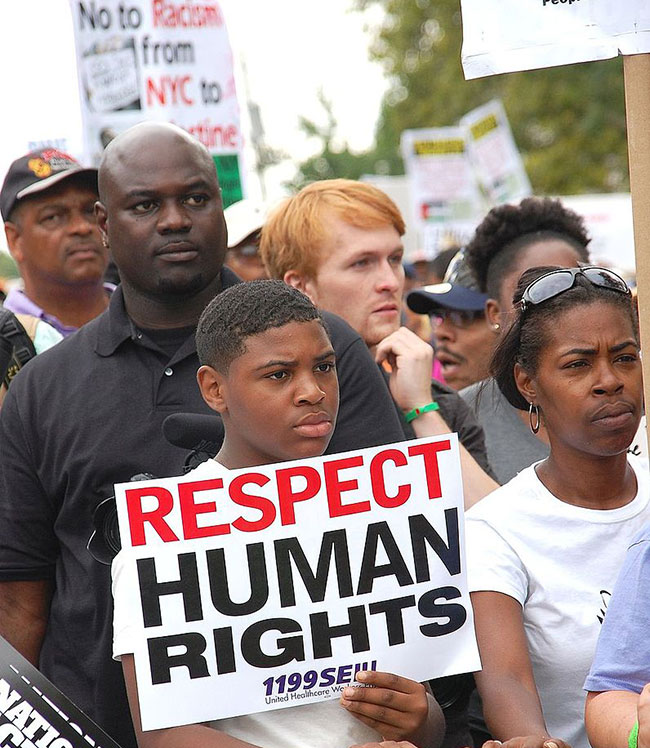
Facebook took a significant step on Monday to shield users from surreptitious monitoring on its social media sites Facebook and Instagram, announcing that it was prohibiting developers from mining data on those platforms for surveillance purposes. Application developers typically use automated data feeds from social media sites, including Facebook, Instagram, and Twitter in commercial surveillance products used by law enforcement throughout the country to track criminal activity, but also as it turns out, spy on protesters and labor unions, with the potential to use these tools to track any individual or organization using social media. Facebook is apparently responding to a controversy brought to light by the American Civil Liberties Union in a report last fall revealing that an intermediary developer Geofeedia was provided access to data feeds by Facebook, Instagram, and Twitter and used that information to monitor protesters in Baltimore and Ferguson, Missouri. The ACLU provides details on contractual arrangements between the social media companies and Geofeedia, including the latter’s access to Facebook data:
Facebook had provided Geofeedia with access to a data feed called the Topic Feed API, which is supposed to be a tool for media companies and brand purposes, and which allowed Geofeedia to obtain a ranked feed of public posts from Facebook that mention a specific topic, including hashtags, events, or specific places. Facebook terminated this access on September 19, 2016.
ACLU stated that Geofeedia claimed to have 500 law enforcement and public safety clients. The report also notes that surveillance companies such as Geofeedia marketed their products with advice to police to monitor hashtags linked to Black Lives Matter and noted the “overt threats” posed by activist groups and unions.
Nicole Ozer, Technology & Civil Liberties Policy Director of ACLU of Northern California, described the vital societal benefit of free and open communication provided by social networks and the latter’s responsibility to protect its users against invasive scrutiny, stating “We depend on social networks to connect and communicate about the most important issues in our lives and the core political and social issues in our country […] Now more than ever, we expect companies to slam shut any surveillance side doors and make sure nobody can use their platforms to target people of color and activists.” Malkia Cyril, executive director of the Center for Media Justice, warned that when social media networks grant access that facilitates governmental surveillance, ” it chills democratic dissent and gives authoritarianism a license to thrive.”
Sign up for our free newsletters
Subscribe to NPQ's newsletters to have our top stories delivered directly to your inbox.
By signing up, you agree to our privacy policy and terms of use, and to receive messages from NPQ and our partners.
Many recognize that social media sites are uniquely effective tools for people of color to communicate about bias and discrimination. Brandi Collins, campaign director for Color of Change, stated that “Social media platforms are a powerful tool for black people to draw attention to the injustices our community faces.” The Center for Media Justice and Color of Change have joined with the ACLU of California in a coalition whose chief goal is to urge social media companies to put effective systems in place to block surveillance efforts using their sites and data.
The ACLU in their report gives credit to social media companies and their leaders who “have expressed support for activists, movements, and free speech,” noting Facebook CEO Mark Zuckerberg’s endorsement of Black Lives Matter and Twitter CEO Jack Dorsey’s trip to Ferguson, Missouri after the killing of Michael Brown and protests brought national attention to that city and to Black Lives Matter. However, the ACLU called attention to the CEOs’ apparent hypocrisy, stating judiciously that “a severe disconnect” existed between their public gestures and “the data access they have provided.”
Data is gold to everyone involved, according to attorney and privacy and data security expert Timothy Toohey. There is, Toohey points out, a core existential conflict for Facebook and Twitter because of the value of information which social media companies control, “which puts them in very difficult positions balancing their commercial interests with other interests.”
Facebook’s and Twitter’s policy modification itself will not stop all surveillance using their ubiquitous social media products; rather, their assiduous devotion to the letter of their stated intent, as demonstrated through careful monitoring and legal action, is the most effective and genuine means of maintaining social media as a genuinely open forum for communication and dialogue on a local and national level.– Louis Altman













